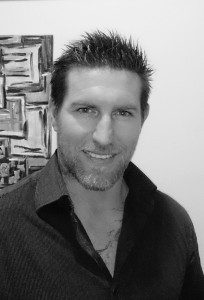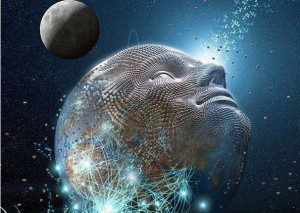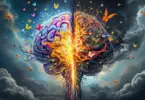Guest Writer for Wake Up World
The collective perception of humanity has been highly influenced by the scientific method, especially over the last few centuries. This consensus has continually evolved throughout that time by transcending old ways of thinking about the ‘reality’ of the universe. It hasn’t stopped either; the accumulating scientific evidence, especially from the quantum, psychological and parapsychological realms, is facilitating a meta-paradigm shift that is significantly influencing the course of humanity’s destiny.
A common mistake made in the mainstream mindset is assuming that science provides an unadulterated snapshot of the totality of reality, but it does have its problems. First, the scientific establishment has become primarily institutionalized, and as with any human enterprise, it is subject to politics, corruption and corporate influence. Second, science cannot explain everything. Third, the established ‘facts’ that are derived through experimenting with the external world have consistently changed over time, effectively illustrating that many truths weren’t truths after all. And finally, philosophical bias ‘unscientifically’ plagues modern science.
[pro_ad_display_adzone id=”110028″]
Therefore, these flaws and misconceptions have fabricated perceptions of the world that are based on many unproven assumptions and outright mistakes. This ‘fact’ is just as applicable today as it has been at any other time in our history, especially in regards to the overarching worldview that science advocates.
Religion used to hold the leadership role for determining how we think on a mass scale. Yet since the birth of the theory of evolution, as well as classical physics and the development of technology to test its ideas, the ‘interpretation’ model that has dominated the explanation of the evidence is scientific materialism. This ‘faith’ has basically hijacked science and made it into a religion, called scientism.
Essentially, materialism is a ‘belief’ that reality and everything in it, including ‘consciousness’, can be reduced to matter, yet this is an unproven and dogmatic philosophy. Furthermore, it’s actually a metaphysical argument as it ‘attempts’ to explain the core truth of existence. Ironically, much of the dogma that makes up this charade has been reinforced by many so-called skeptics who don’t actually investigate the evidence objectively, something that sites like Skeptical About Skeptics have made embarrassingly clear.
Regardless, the illusory reign of a purely mechanistic and material universe has come to an end and the majority of people are slowly waking up to it, including many scientific experts who won’t admit it publicly in fear of it impacting the success of their careers. In response to this unscientific state of science, eight respected scientists (including Rupert Sheldrake Ph.D, who is interviewed below) developed a “Manifesto for a Post-Materialist Science … to visualize what an emerging scientific view may look like” and have called upon the scientific community to face their hypocrisy.
The following quotes are taken from this manifesto, and clearly and succinctly reflect why these disciplines have arisen to put the final nails in the coffin of the materialistic worldview.
Quantum Mechanics:
This is the realm of entanglement, meaning that particles are interconnected and can instantly share information beyond the law of classical space-time. Particles also exist in two or more places at once. Even more mind-bendingly, the act of observation determines reality.
“QM has questioned the material foundations of the world by showing that atoms and subatomic particles are not really solid objects—they do not exist with certainty at definite spatial locations and definite times. Most importantly, QM explicitly introduced the mind into its basic conceptual structure since it was found that particles being observed and the observer—the physicist and the method used for observation—are linked. According to one interpretation of QM, this phenomenon implies that the consciousness of the observer is vital to the existence of the physical events being observed and that mental events can affect the physical world. The results of recent experiments support this interpretation. These results suggest that the physical world is no longer the primary or sole component of reality and that it cannot be fully understood without making reference to the mind.”
The following video is a straightforward presentation of the philosophical shift that quantum physics demands:
Psychology:
This science illustrates that mental constructs change the physicality of the brain, not just the other way round as a reductionist-materialist would have us believe.
“Studies have shown that conscious mental activity can causally influence behavior and that the explanatory and predictive value of agentic factors (e.g., beliefs, goals, desires, and expectations) is very high. Moreover, research in psychoneuroimmunology indicates that our thoughts and emotions can markedly affect the activity of the physiological systems (e.g., immune, endocrine, and cardiovascular) connected to the brain. In other respects, neuroimaging studies of emotional self-regulation, psychotherapy, and the placebo effect demonstrate that mental events significantly influence the activity of the brain”
Parapsychology:
This field is still considered a pseudoscience by the scientific orthodoxy, however there is no justifiable or truly scientific reason why this is the case. It is simply biased to omit the compelling evidence which illustrate that human minds can impact and connect with the world around it. Simply, the scientific establishment is behaving unscientifically and have a lot to answer for due to their prejudiced position, especially because emerging from this legitimate scientific methodology are very robust experiments of investigation which have produced some highly statistically significant data sets as a result.
“Studies of the so-called “psi phenomena” indicate that we can sometimes receive meaningful information without the use of ordinary senses, and in ways that transcend the habitual space and time constraints. Furthermore, psi research demonstrates that we can mentally influence—at a distance—physical devices and living organisms (including other human beings). Psi research also shows that distant minds may behave in ways that are nonlocally correlated, i.e., the correlations between distant minds are hypothesized to be unmediated (they are not linked to any known energetic signal), unmitigated (they do not degrade with increasing distance), and immediate (they appear to be simultaneous). These events are so common that they cannot be viewed as anomalous or as exceptions to natural laws, but as indications of the need for a broader explanatory framework that cannot be predicated exclusively on materialism.”
The Way Forward? Remove the Dogma for a Post-Materialist Worldview
An interview with Rupert Sheldrake
Rupert is a British scientist who has worked in developmental biology and consciousness studies. He is an active researcher, author and public speaker and has been a leading voice in pointing out the dogmas that are restricting contemporary science. His lastest book Science Set Free (US version) or The Science Delusion (UK version) shows how the sciences could be liberated from the dogmas of materialism and regenerated.
In this episode Rupert first focuses on the philosophical bias that has severely impacted the worldview heralded by science today. He points out that many of his scientist colleagues have different beliefs then what they admit publicly and then moves onto some of the parapsychological research that scientifically shows that the mind is interwoven with the external world. He also briefly discusses his own theory of ‘morphic fields’, which he believes explains how the mind projects into the external world, why “memory is inherent nature” and that “most of the so-called laws of nature are more like habits”.
The Verdict
The demise of materialism has been reinforced by contradictory evidence, as well as its epic failure to explain what consciousness actually is, at what point matter becomes ‘alive’ and why the human mind and its intangibilities have a direct impact on the external world, including the human body. The reality is we are now transforming into a philosophical worldview which is actually a rebirth of ancient wisdom. In very simple terms, this understanding accepts that consciousness or mind plays a fundamental and co-creating role in our interconnected and ‘life-full’ reality.
The perception of the interconnectedness of life can also be viewed through various prisms. Ecologically, we are interdependent with all life on earth. Science clearly illustrates it. We can also refer to various spiritual and tribal traditions which have advocated for eons that we are one and the same at our core.
Therefore, this wisdom is not just making a passionate resurgence through the opening of individual minds and hearts to spiritual experiences – such as psi phenomena, synchronicity and symbolism – but it’s also making an evidence-based comeback through the information that has emerged from the quantum, psychological and parapsychological fields.
Please note: This article is part of the Redesigning Society series. Over the coming weeks, this series will present a range of expert perspectives on the current state of societal affairs, as well as the collective changes we desperately need both philosophically and practically. Details of upcoming and past guests and topics can be viewed here. You can subscribe to The Conscious Society Youtube Channel to get early access to each interview in the series.
Previous articles by Phillip J. Watt:
- 8 Powerful Conversations of a Conscious Society
- The Awakening Of Society Is Just As Important As The Awakening Of Our Self
- The Ego is the Source of Suffering AND Contentment
- The Orchestra of Reality – a Journey through Science, Spirituality & Symbolism
- 8 Emotional Patterns That Can Disturb Our Inner Peace
- 8 More Emotional Patterns That Can Disturb Our Inner Peace
- Finding Our Peace: The Art of Loving Our Experience
- A Day in the Life of Mindfulness
- Permaculture – What Is It and Why Is It Important?
- Matter vs. Spirit – A Guide to Participating in the Greatest Debate Ever
About the author:
 Phillip J. Watt lives in Sydney, Australia. He identifies as a ‘self-help guide’ as he has long focused on his physical, mental, emotional and spiritual health and then shares those lessons with his clients and readers. His written work also deals with topics from ideology to society, as well as self-development.
Phillip J. Watt lives in Sydney, Australia. He identifies as a ‘self-help guide’ as he has long focused on his physical, mental, emotional and spiritual health and then shares those lessons with his clients and readers. His written work also deals with topics from ideology to society, as well as self-development.
Phil has a degree in Social Science and Philosophy and has been trained extensively in health services. He assists adults, children and families as a mentor, relationship mediator and health and life teacher. He also provides online support services for personal healing and growth, assisting his clients to grow their skills and knowledge in life management and adventure.
Follow him on Facebook or visit his website www.vitalityguidance.com where you can reach him for a personal appointment.
[pro_ad_display_adzone id=”110027″]







